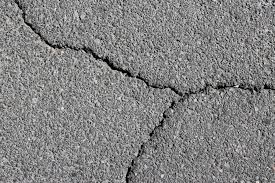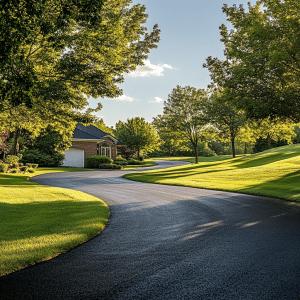In this post, we’ll explore the top 10 signs that indicate your asphalt driveway needs repairs, focusing on common problems like cracked asphalt and potholes, as well as tips on how to address these issues effectively.
1. Cracks in the Asphalt
One of the most common signs that your asphalt driveway needs immediate attention is the presence of cracks. Cracked asphalt can arise from a variety of factors, including temperature fluctuations, heavy traffic, and age.
Why Are Cracks a Concern?
Cracks are not just unsightly; they can lead to more severe issues if left untreated. Water can seep into cracks, causing further damage. If you notice cracks starting to form, it’s essential to consider preventing and repairing cracks in your asphalt driveway as soon as possible.
2. Potholes
Another significant issue that homeowners face is potholes. These depressions in your driveway are typically caused by the same factors that create cracks but are often more damaging.
Addressing Pothole Formation
Potholes can be a safety hazard, especially for vehicles and pedestrians. If you’ve noticed potholes forming, it’s time to schedule some pothole repair. Ignoring these can lead to more extensive repairs down the line.
3. Uneven Surfaces
An asphalt driveway should ideally have a smooth surface. If you notice uneven patches or dips, it could indicate an underlying issue, such as poor drainage or inadequate installation.
Impact of Uneven Surfaces
Uneven surfaces can lead to water pooling, which can exacerbate the deterioration of your driveway. If left unaddressed, this can lead to significant structural problems.
4. Fading Colour
Over time, the rich black colour of asphalt can fade due to UV rays and weather conditions. While this may seem purely aesthetic, it is an indicator that your driveway is losing its protective sealant.
Restoring Colour and Protection
If you notice your driveway looking dull, consider applying a seal coat. This not only restores the colour but also adds a layer of protection against the elements. For more information, check out our post on asphalt driveway restoration in Brisbane.
5. Crumbling Edges
The edges of your asphalt driveway are particularly vulnerable to crumbling. This can happen due to erosion or the weight of vehicles parked too close to the edge.
Preventing Edge Damage
If you notice crumbling edges, it’s crucial to address this issue promptly. Not only does it impact aesthetics, but it can also lead to further deterioration of the driveway.
6. Drainage Issues
If you find that water tends to pool in certain areas of your driveway, you may have a drainage issue. Proper drainage is essential to prolonging the life of your asphalt driveway.
Importance of Drainage
Poor drainage can lead to cracks and potholes, so it’s vital to ensure that your driveway is properly sloped to allow water to flow away.
7. Surface Flaking
Surface flaking or raveling is another sign that your asphalt driveway may need repairs. This occurs when the top layer of asphalt begins to break down, exposing the underlying layers.
Addressing Surface Flaking
If you notice flaking, it’s important to act quickly. Regular maintenance and sealcoating can help protect your driveway and prevent further deterioration.
8. Oil Stains
Oil stains can be a significant issue for asphalt driveways. Not only do they look unsightly, but they can also weaken the asphalt over time.
Cleaning and Treatment
Regular cleaning and immediate treatment of oil stains can help maintain the integrity of your driveway. Use a degreaser specifically designed for asphalt to remove these stains effectively.
9. Weeds and Grass Growing Through Cracks
If you start seeing weeds or grass growing through cracks in your driveway, it’s a clear indication of deterioration. These plants can exacerbate the cracking and lead to further damage.
Controlling Weeds
Pulling out weeds manually or using a weed control product can help manage this issue. However, it’s also essential to repair the cracks to prevent regrowth.
10. Age of the Driveway
Finally, consider the age of your asphalt driveway. Most asphalt driveways last between 15 to 30 years, depending on maintenance and usage. If your driveway is approaching this age, it may be time to consider asphalt driveway repairs or even resurfacing.
Assessing the Need for Resurfacing
If your driveway is nearing the end of its lifespan, a professional assessment can help determine whether resurfacing or complete replacement is the best option. For more insights, read our article on when asphalt driveway resurfacing is the right time.
Maintaining your asphalt driveway is crucial to ensure its longevity and functionality. By keeping an eye out for these 10 signs, you can address issues promptly and enjoy a safe, attractive driveway for years to come. If you’ve noticed any of these signs, don’t hesitate to reach out for asphalt driveway repairs. Whether you need a simple patch for cracked asphalt or a complete overhaul, professional help is just a call away.
For more information on our services, feel free to contact AllBlack Driveways today!




















